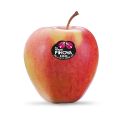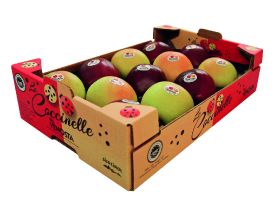
Italian marketer VI.P is rolling out a new brand identity for its Val Venosta apples this year, a move it says will present its fruit in a more competitive and attractive manner, hopefully providing a boost in terms of sales throughout the season. Featuring a more iconic design, the company says it wants to differentiate Val Venosta apples from those sold by its competitors and add value by means of a new and more modern marketing strategy.
Launched on the Italian market in March and due to appear in all of the company’s export markets over the coming months, the rebranding of all Val Venosta packaging, promotional materials and advertising activities is the company’s first such revision in seven years. The fields and mountains featured in the brand’s previous incarnation have gone, replaced with a more simple concept comprising two ladybird motifs; a yellow/gold one to represent quality and a red one to convey the naturalness of the products.

This week, the group has also unveiled a new sub-brand for Pinova apples, a premium, bi-coloured variety it regards as a highly promising commercial prospect, especially when it comes to younger consumers. A new graphic design will appear on all Pinova packaging, labels and advertising materials.
According to the architects of the rebranding exercise, chiefly VI.P marketing director Michael Grasser and director Josef Wielander, origin remains an important value that the new identity will have to convey, as does the broad range of varieties – not to mention other products besides apples, such as vegetables – that the company sells. Organic produce will retain a point of difference too, with a green ladybird replacing the yellow one for Bio Val Venosta organic apples. These now represent around 10 per cent of its total business, compared with 80 per cent for conventional apples.
According to VI.P managing director Josef Wielander, it’s the final stage in a process of modernisation over the past few years that has seen the group focus more closely on its products, the services it provides in delivering those products, and ultimately the branding of that entire package. “We’ve tried to innovate and optimise all of the main processes involved in producing and marketing our fruit,” he says.

Innovation is also expected in terms of the product offer itself. For example, VI.P plans to begin marketing special cartons known as Le Coccinelle (The Ladybirds), containing a mixture of alternating yellow and red varieties; typically these will be Golden Delicious alongside Stark, Pinova or Gala. The ultimate aim, Grasser suggests, is to provider those selling Val Venosta-branded apples with something different.
That’s hugely important for the long-term future of trademark, which continues to command a sizeable share of the branded apple market in Europe. Around half of the 350,000 tonnes of apples supplied by VI.P each year is sold under the brand, with the remainder sold under private label; and while Italy takes about 50 per cent of that production, there are now around 50 export markets where Val Venosta apples are sold. For the group’s 1,770 grower members, it seems, reminding the international market of Val Venosta’s inherent qualities is very much the natural thing to do.



